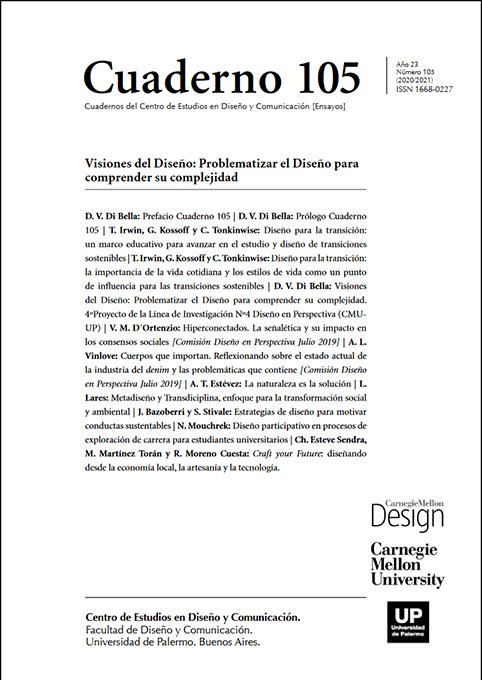Participatory design facilitation in career exploration processes for college students
Résumé
Offering opportunities for students to collaborate and reflect through creative exploration and peer support, participatory design facilitation emerges as an innovative approach for interventions supporting career exploration in college. This paper presents a study developed within a summer internship program for undergraduate students at a North American university. Participatory design workshops discussed challenges, life goals and choices in career exploration. Findings related to individualized work-centered lifestyles, pressure for success, rich exchange of experiences, and increasing self-direction are presented. The study showed the potential of participatory design facilitation to open a space for dialogue and creative collaboration. The emerging themes allow for further investigation and innovative design interventions to support career decision-making in the transition to adulthood.
Références
Arnett, J. J. (2007). Adolescence and Emerging Adulthood: A Cultural Approach (3rd ed.). Upper Saddle River, N.J.: Pearson Prentice Hall
Arnett, J. J. (2014). Emerging adulthood: The winding road from the late teens through the twenties. Oxford University Press.
Baxter Magolda, M. & Taylor, K. (2015). Developing Self-Authorship in College to Navigate
Emerging Adulthood. In: Arnett, J. J. (Ed.). (2015). The Oxford Handbook of Emerging Adulthood. Oxford University Press.
Beck, M. (2012). Delayed Development: 20-Somethings Blame the Brain. Retrieved from http://online.wsj.com/article/SB10000872396390443713704577601532208760746.html.
Bernaud, J-L. (2014). Career counseling and life meaning: a new perspective of life designing for research and applications. The Construction of the Identity in 21st century: A Festschrift for Jean Guichard, eds A. Di Fabio and J-L. Bernaud (New York, NY: Nova Science), 29-40.
Brandt, E.; Binder, T. & Sanders, E. B. N. (2012). Ways to engage telling, making and enacting. In Simonsen, J., & Robertson, T. (Eds.). Routledge international handbook of participatory design. Routledge, New York, 145-181.
Bratteteig, T. (2016). Participatory Design: methods & techniques & design as a research approach. Available at http://www.uio.no/studier/emner/matnat/ifi/INF5722/h16/lectures/pdmethods-2016.pdf
Buchanan, R. (1992). Wicked problems in design thinking. Design Issues, 8(2), 5-21.
Cargo, M.; Grams, G. D.; Ottoson, J. M.; Ward, P. & Green, L. W. (2003). Empowerment as Fostering Positive youth development and Citizenship. American Journal of Health Behaviour 27, S66-S79.
Cassim, F. (2013). Hands on, hearts on, minds on: design thinking within an education context. International Journal of Art & Design Education, 32(2), 190-202.
Chinman, M. J. & Linney, J. A. (1998). Toward a Model of Adolescent Empowerment: Theoretical and Empirical Evidence. The Journal of Primary Prevention 18, 393-413.
Collin, P. & Swist, T. (2016). From products to publics? The potential of participatory design for research on youth, safety and well-being. Journal of Youth Studies, 19(3), 305-318.
Côté, J. E. & Levine, C. G. (2002). Identity formation, agency, and culture: A social psychological synthesis. Mahwah NJ: Lawrence Erlbaum.
Creed, P. A.; Patton, W. & Prideaux, L. A. (2007). Predicting change over time in career planning and career exploration for high school students. Journal of Adolescence, 30(3), 377-392.
Frandsen, M. & Petersen, L. (2012). From ‘troublemakers’ to problem solvers: designing with youths in a disadvantaged neighborhood. In Proceedings of the 12th Participatoryy Design Conference: Exploratory Papers, Workshop Descriptions, Industry Cases-Volume 2 (pp. 105-108). ACM.
Gordon, V. N.; Habley, W. R. & Associates (2000). Academic advising: A comprehensive handbook. San Francisco: Jossey-Bass.
Iversen, O. & Smith, R. (2012). Scandinavian participatory design: dialogic curation with teenagers. In Proceedings of the 11th International Conference on Interaction Design and Children (pp. 106-115). ACM.
Kracke, B. (2002). The role of personality, parents and peers in adolescents career exploration. Journal of Adolescence, 25(1), 19-30.
Lundmark, S. (2016). Designing for Online Youth Counselling. Empowerment through Design and Participation. Uppsala Studies in Education 140. 140 pp. Uppsala: Acta Universitatis Upsaliensis. ISBN 978-91-554-9725-5.
Malinverni, L. & Pares, N. (2017). An Autoethnographic Approach to Guide Situated Ethical Decisions in Participatory Design with Teenagers. Interacting with Computers, 29(3), 403-415.
Maree, J. G. & Twigge, A. (2016). Career and self-construction of emerging adults: The value of life designing. Frontiers in Psychology, 6, 2041.
Martin, B. & Hanington, B. (2012). Universal methods of design: 100 ways to research complex problems, develop innovative ideas, and design effective solutions. Rockport Publishers.
Mouchrek, N. (2014). Design strategies and competences to promote the culture of sustainability among youth. 149p. Thesis (Master Degree). State University of Minas Gerais, Brazil.
Mouchrek, N. (2019). Empowerment in the Transition to Adulthood: Supporting Career Exploration in College Using Participatory Design (Doctoral dissertation, Virginia Tech). Available at https://vtechworks.lib.vt.edu/handle/10919/90893.
Mouchrek, N. & Tatar, D. (2018, August). Youth places: collaborative cartography with young people in Belo Horizonte, Brazil. In Proceedings of the 15th Participatory Design Conference: Short Papers, Situated Actions, Workshops and Tutorial-Volume 2 (p. 19). ACM.
Sanders, E. B. (2008). An evolving map of design practice and design research. Interactions 15, 6 (Nov. 2008), 13-17
Schwartz, S. J.; Côté, J. E. & Arnett, J. J. (2005). Identity and agency in emerging adulthood two developmental routes in the individualization process. Youth & Society, 37(2), 201-229. doi: 10.1177/0044118X05275965
Steinberg, L. (2007). Adolescence (8th ed.). Boston: McGraw-Hill Higher Education.
Zelenko, O.; Hides, L.; Kavanagh, D.; Stoyanov, S.; Quek, L-H.; Tulloch, K. & Price, M. (2014). Using Participatory Design (PD) as youth engagement strategy to inform design and development of evidence-based wellbeing e-tools. In Young and Well CRC Connect 2014, 20-21 February 2014, Melbourne, Vic.
Los autores/as que publiquen en esta revista ceden los derechos de autor y de publicación a "Cuadernos del Centro de Estudios de Diseño y Comunicación", Aceptando el registro de su trabajo bajo una licencia de atribución de Creative Commons, que permite a terceros utilizar lo publicado siempre que de el crédito pertinente a los autores y a esta revista.


